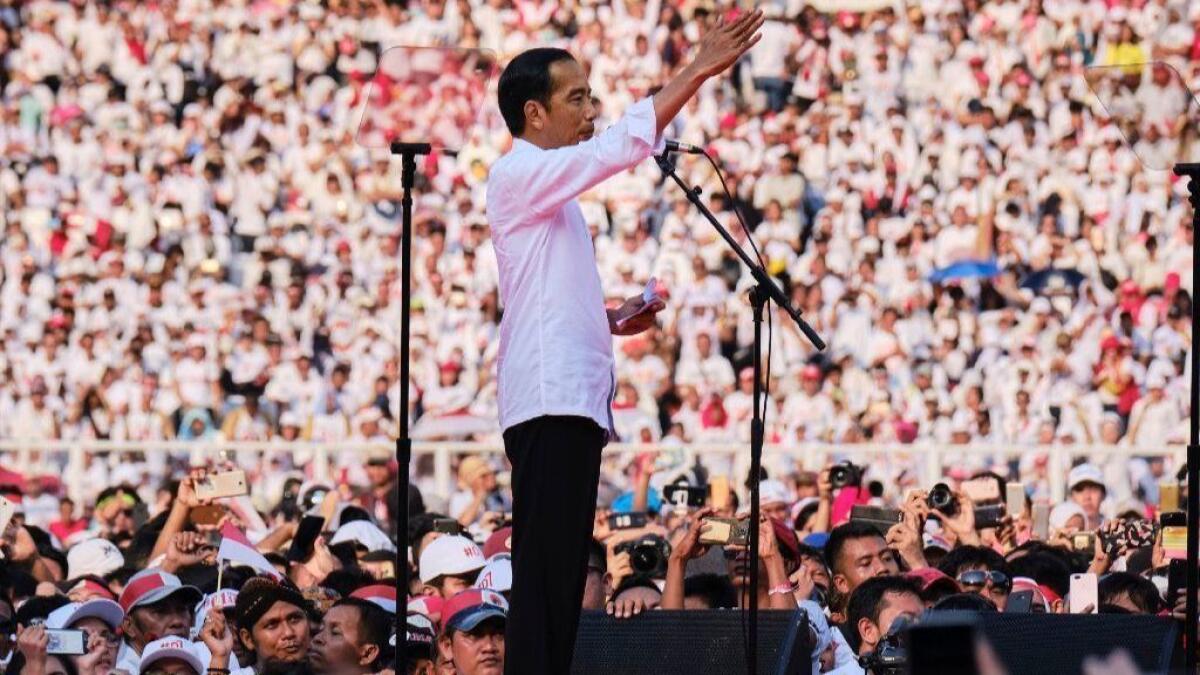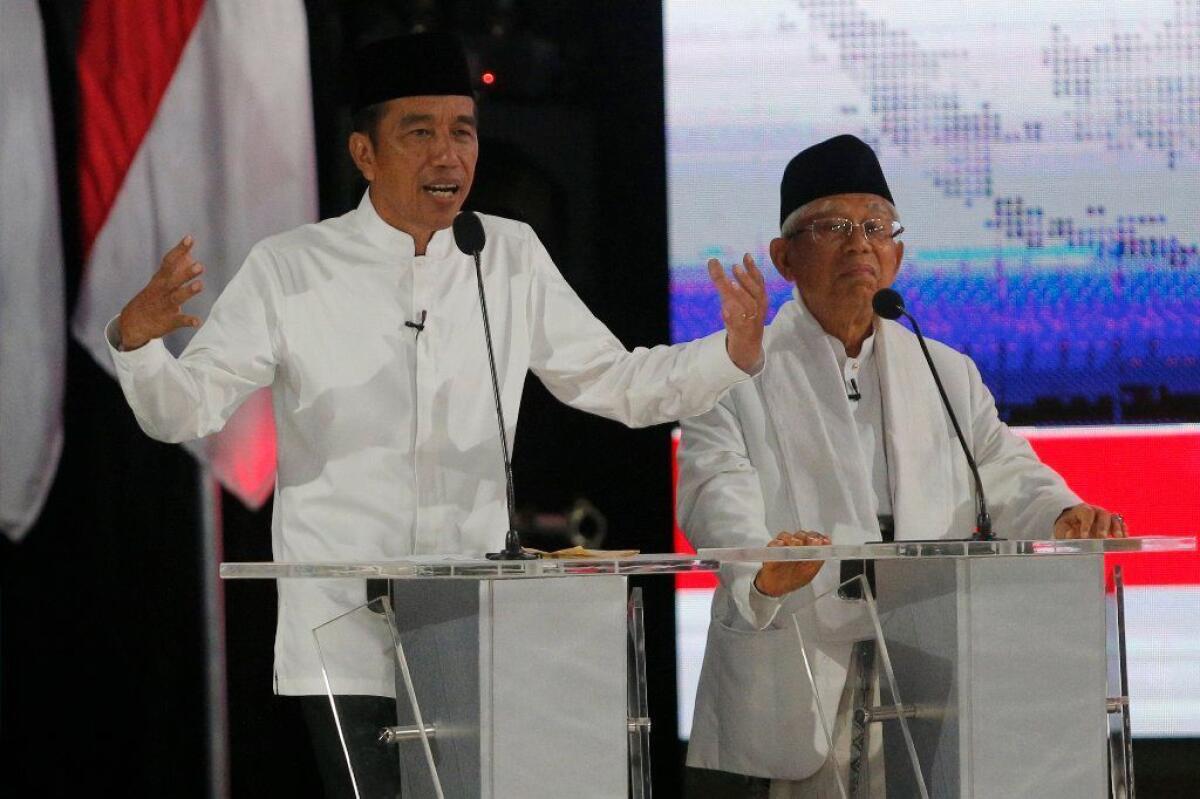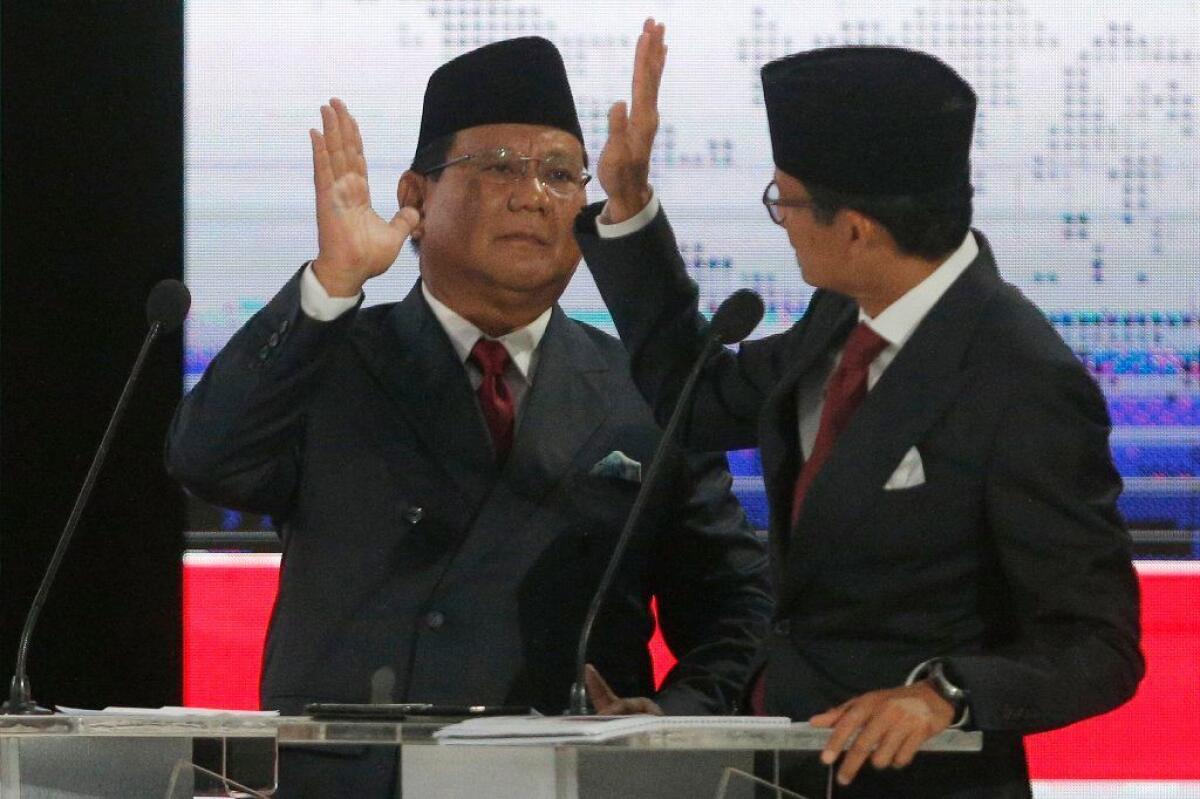Indonesia’s election focuses on: Who will be more Islamic?

- Share via
Reporting from Jakarta, Indonesia — When the Christian governor of Jakarta was tried in 2017 on dubious charges of insulting Islam, an influential conservative Muslim cleric spoke out against him. With help from that testimony, the politician was convicted of blasphemy and sentenced to two years in prison.
The ruling signaled the widening clout of religious hard-liners in Indonesia, the world’s most populous Muslim nation. And it left a mark on moderate first-term President Joko Widodo, better known as Jokowi, an ally of the convicted governor who also faced accusations he wasn’t “Muslim enough.”
Two years later, Jokowi is running for reelection — with Ma’ruf Amin, the cleric who denounced the governor, as his vice presidential candidate.
The unlikely pairing announced last summer stunned many supporters of the president, a sunny former furniture entrepreneur who is seeking a second and final five-year term when Indonesians vote Wednesday.
In a staggeringly large election with 192 million eligible voters scattered across 17,000 islands, Jokowi is the clear favorite: Most polls give him a double-digit lead over Prabowo Subianto, the gruff former general whom he defeated in 2014 by 6 percentage points.
But Jokowi bears scars from that endeavor, during which a concerted campaign of online rumors falsely labeled him a lapsed Muslim, ethnically Chinese or a secret communist.
Analysts say that by choosing Amin as his running mate, Jokowi hoped to neutralize the question of his religiosity in a country that is nearly 90% Muslim — and by many accounts growing more conservative.
In December, a Singaporean retailer was forced to withdraw a TV commercial featuring a K-pop girl group from Indonesian airwaves after the singers’ miniskirts caused an outcry. Around the same time, the Indonesian attorney general’s office launched an app that allowed users to report perpetrators of “religious heresy,” raising concerns it would be used to target minority faith groups.
Amin is the leader of Nahdlatul Ulama, Indonesia’s largest Muslim organization, which has historically espoused moderate views. But he has endorsed female genital mutilation, advocated the criminalization of same-sex relations and, according to Human Rights Watch, “played a pivotal role in fueling worsening discrimination against the country’s religious and gender minorities.”
Appearing side by side in presidential debates in recent weeks, they have appeared ill suited for each other — Jokowi, the 57-year-old man of the people, and the stiff 76-year-old cleric. Instead of pushing religious issues to the background, Jokowi’s choice seems to have accentuated the question of faith against Prabowo, who has also surrounded himself with hard-line clerics and styles himself as the candidate of the Muslim working class.
“All of the issues right now are being buried under identity politics, under who will be more Islamic than the other,” Made Supriatma, former editor of the Indonesian news service JoyoNews, told an audience Monday at the ISEAS-Yusof Ishak Institute, a Singaporean think tank.
“The real issues are not being addressed.”
Jokowi went from running a furniture business in his hometown of Solo to local politics, to being elected governor of the Jakarta capital region, which catapulted him to national prominence. His first presidential campaign was compared to Barack Obama’s, with his outsider status, mantra of change and passing physical resemblance.

In office, however, critics say, Jokowi’s focus on building showy infrastructure projects has failed to create enough decent jobs. Indonesia’s economy, the biggest in Southeast Asia, is purring but not roaring, its 5% annual growth rate falling shy of the 7% Jokowi had campaigned on, and inequality growing faster than anywhere else in the region.
He also has made little progress on tackling corruption or the legacy of human rights abuses left over from decades of authoritarian rule under the late dictator Suharto.
Jokowi brought some top members of Suharto’s feared security establishment into his government. And he allowed authorities to block protests last year that called for him to be defeated at the polls — the first time since the Suharto era that state security forces repressed a democratic opposition movement.
“His most ardent supporters from 2014 may actually stay away from the polls this time,” said Dewi Fortuna Anwar, a research professor at the Indonesian Institute of Sciences.
“The idealistic civil society groups who really campaigned very hard for him with the expectations that he would be a true reformer, they’ve been somewhat disenchanted,” she added.
But reform-minded Indonesian voters have little reason to cheer for Prabowo, a former special forces commander under Suharto and the late dictator’s former son-in-law. The 67-year-old is accused by human rights groups of having ordered the killings of separatists and student dissidents — charges he denies.

Prabowo has also pandered to Islamist groups. He backed the 2017 blasphemy case, and one of his recent campaign rallies featured a recorded endorsement from the leader of the hard-line Islamic Defenders Front, which has campaigned to implement strict sharia law in Indonesia.
Analysts say both candidates are using Islam for political expediency.
“The irony is that, as individuals, both candidates are moderate Muslims with secular political orientations,” said Eve Warburton, research fellow at the Coral Bell School of Asia Pacific Affairs at Australian National University. “But they have each enlisted the support of very different sorts of Islamic organizations, which in turn reflect the major ideological cleavage in Indonesian society.”
Earlier this month, more than 30 civil society groups — including labor unions, environmental activists and indigenous peoples’ movements representing some 18 million Indonesians — called on their members to abstain from voting.
The so-called golput movement, from the Indonesian term for “white group,” refers to turning in a blank ballot and threatens to cut into Jokowi’s support.
The president’s allies reject accusations of authoritarianism, saying he has acted to preserve stability in a vast, diverse country. But critics say he has prioritized winning reelection over strengthening institutions in this fledgling democracy.
“Some may argue that Jokowi will be a different kind of president in his second term, when the pressures of reelection no longer limit his autonomy,” Warburton said. “But we know the legacy Jokowi wants to leave is very much a developmental one, and over the last 4½ years we have little indication that he thinks about the legacy his presidency will leave for Indonesia’s democratic system.”
ALSO:
‘Everything is already decided’: Thailand’s army is set to cement power with an election
How mountains of U.S. plastic waste ended up in Malaysia, broken down by workers for $10 a day
As Hong Kong grows, locals contend with a big, fat, hairy wildlife problem
More to Read
Sign up for Essential California
The most important California stories and recommendations in your inbox every morning.
You may occasionally receive promotional content from the Los Angeles Times.











